#I ALSO REALLY LIKE THE DESIGN OF SUA'S SISTER?
Explore tagged Tumblr posts
Text
SUA LORE (I'm going to die one of these days fuck)
When Sua was younger, among all the sisters she had grown up with, she had one older sister, but seemingly, unlike their other sisters, that woman didn't treat Sua with hostility, in fact, she looked like she doted on Sua and looked out for her.

Translation (Creds to: @/greenbean1467 on yt in the comments section):


1/2 ?: You should take care of your hair. (Woah, careful) ?: So immature… 2/2 ?: Alright, it can’t be helped. Sua has to be punished! Tickle tickle! [ At that time, you were my only person, and for that reason, you also made me afraid. ]
"You were my only person, and for that reason, you also made me afraid" Is just...All her life, Sua had been an isolated individual, by choice, and because she had been shunned by her family, avoided due to her cold nature, and during those times she's only had two people to who she could really show herself too, this woman and Mizi, this woman being the only person Sua had in her life I can only imagine how afraid Sua was of losing her sister, and just how much her sister terrified her at times.


1/2 SUA: Mhm, so mother said, it’ll be time to leave after ten more nights. And mother seems happy, and I too… SUA: And that pink-haired kid could be there too, so… ?: Didn’t I tell you it’s uncouth to wiggle your toes like that? 2/2 SUA: Oh… I won’t then. ?: Ugh, so cute! ?: But you know, big sis is worried. ?: Worried that our immature little Sua could just up and die in that hellish place.
This woman and Sua look to be close; they are affectionate, and Sua almost seems to look up to this woman as if a sister figure, but the detail here I'm interested in is how worried this woman is about Sua and her remarks about Sua, she cares about Sua. Still, it shows that she looks down on Sua to some degree, whether this be in a teasing tone or not, I'm unsure. But there's an obvious obsessive fixation on Sua's innocence. And even in this relationship, cruelty was reinforced as a means to an end.


1/2 ?: You’re already so stupid, what if you just up and die in that place? ?: You poor thing, Sua. [They say that corpses fall from the sky in that place. When a weak kid like Sua just up and dies, They burn those kids in a hot, hot fire, And then they open the sky lid to sprinkle them over the living kids Like snow raining down. ] 2/3 ?: Even if it's not, I'm not smart, but I've gone so far ?: Pick--If you die. What should I do? ?: It's so cute Sua.
Growing up under the same guardian, Nigeh, who valued quality and beauty in her pets, it becomes obvious why Sua's sister was criticizing her appearance. She'd grown up hearing the same criticisms from the harsh and cold Nigeh who didn't care for their pets beyond their value, and what all they could bring to the plate, I could imagine just what kinds of things Nigeh would say to a pet human with "abnormalities".
Sua, however, was the perfect pet human, she was pretty, obedient, and acted obediently for Nigeh as a manicured doll to meet their expectations. She was attached to Nigeh like a daughter to a mother, looking to their validation to feel as if she was more valuable than she truly was even though the love wasn't reciprocated. For these reasons, she was treated differently from her other sisters, of course, there would be a level of envy and projection from Sua's sister.
Sua's sister is shown to be anxious about Sua, she seems to have been attached to her in the way a hurt child needs a security blanket to rest at night, Sua is so childish, naive, and stupid, it is reassuring to her sister to have someone to care for, as if there was still hope in this world, so without Sua, her sister's worries wouldn't be soothed, her sister was so scared that she even threatened Sua with fear, expressing how frightening and horrific this environment would be (Like, "Pick, if you die" I read it as "If I lose you, what should I do?)
In this way, Sua seems to parallel mirror woman because Sua had this same dependency on Mizi, again, in the way a hurt, lonely, scared child needs a security blanket to rest at night, Sua wanted Mizi to remain naive and stupid, willingly kept her in the dark so that Sua could feel a sense of peace and security through her, her sister was the same way with Sua, she wanted to keep Sua from the hell she would be subjected to very, very soon, but in the end, telling Sua ugly truths, about the snow, and all, had to have been fueled by bitter feelings, to rid Sua of that type of innocence, could have been any kind of love, perhaps in a twisted way she wanted to protect Sua.
She obviously had to have been mentally unstable (understandably) to say these kinds of things to a child, no less, the way she stares at Sua like she's desperate and broken, really, it's not loving, it's just desperate and cruel. Really, the fact that Alien stage can bring a person to this kind of insanity is a horrifying concept. Still, I believe she was trying to teach a lesson to Sua at this time in her life when she was growing up, making attachments and being susceptible to impressions, it was purposely harsh to frighten her, to project her fears onto Sua, and those words from her sister stuck with Sua for the rest of her life.

From that day on, all Sua could think about was death, all she could do was worry and worry until she met Mizi again.
Meeting Mizi, in all her optimism and bright smiles, was like a healing balm on Sua's wounds, or in other words, her "Cure" .


1/2 SUA: Big sister, your words then made me, as young as I was, all the more afraid. I imagined “just up and dying” so many times, even more than before… 2/2 SUA: But if I meet you again, I want to tell you this. That you were wrong. The one to be pitied was probably you.


1/2 SUA: If this is hell… 2/2 MIZI: Found you! You're that snow doll!
Interestingly enough, Mizi calling Sua a "snow doll" may be a foreshadowing of Sua's death, as now it's semi-confirmed that dead children are cremated and sprinkled down onto the Anakt children's faces, but they only think it's snow. (THAT IS JUST FUCKING SICK. someone kill me)
And a parallel to the MIZISUA video, their first meeting. (The nickname is just--telling of how Sua is perceived, as a little dressed-up doll.)
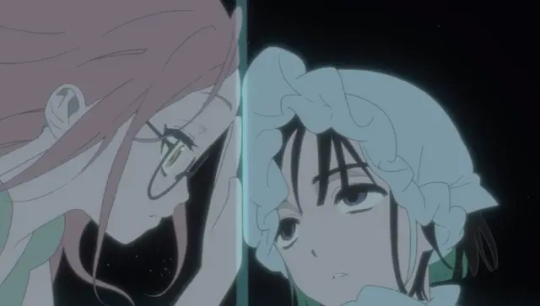
(And that fact just gives this piece a wholeeee darker meaning. of course. It somewhat disproves the theory that the dead are instead fed to the Wagyein, but I don't know which is worse. Then again Sua's sister could've been going off on a psychotic rant, so I'm not taking it too seriously. It's a weird coincidence though)
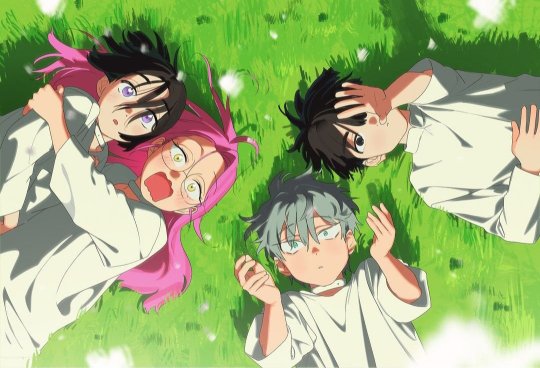


1/2 SUA: Where else could you find such a paradise so wonderful? 2/2 SUA: So you're wrong.
(Some nuance may be lost in translation. I died)
So this comic, like Ivan's comic after ROUND 6, Cure, Heavenly Garden, was Sua's reminiscing during her final moments, and her only thoughts were the words of her sister, her face, haunting as it was, and Mizi, her universe.
Sua's sister pitied her for her inevitable fate, she had known the life of being a pet-human, used, abused, and hurt, she feared death and still had her instincts intact. Knowing Sua would go through the same cycle and then meet a terrible fate on that hellish stage...tasted bitter. It was frightening, but it was one small liberty for Sua to make it something of her own.
But for Sua, it was far from hell. Sua's sister references Anakt garden and Alien stage as a whole as hell because it's a one-way ticket to your demise, there is no true life once you're in, that's why it's so frightening, but being found by Mizi in that garden--Mizi was wonderful, Mizi made Sua feel like a child, to feel warm in her bright, gentle light, feeling the tranquility of feeling freed and loved in the comfort of Mizi's gentle song, Sua didn't want to be pitied, she didn't even regret making it this far, she didn't care about death as long as she wasn't without Mizi, Because to be able to be with her, and sing with her...everything was all worth it to meet Mizi. For Sua, there is no fate more miserable than living a life without Mizi and dying that way. Living a life of loneliness and anxiety was pitiful.
Side note, the title of this comic, Heavenly Garden, maybe a religious reference and, more specifically, a reference to the Garden of Eden. The themes here that connect to "Return to the Great Anakt", all children, in ashes and all will eventually return to the great Anakt, it gives me the idea that after Sua's death, her "Heaven", was returning to Anakt Garden and returning to her paradise, Mizi.
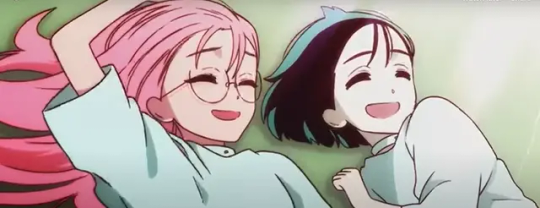
#I have never said I want to kill myself in a fandom more than I have after following alien stage#im going to kill myself by the way#THIS IS JUST#RUGHGHHHHH#straight yammering IM IN PAIN#VIVINOS. QMENG. YOU ARE SICK.#alien stage#alnst#alien stage sua#mizisua#alnst sua#sighffhh#sighhghgh#i adore Sua and Till's stories so much#and im still puzzled on the meaning behind the title buttttt#i think its a type of symbolism#I ALSO REALLY LIKE THE DESIGN OF SUA'S SISTER?#SHE'S GORGOUS#kind of insane but#she's beautiful#sob#*explodes*#Ivan and Sua's dying thoughts via comics coming out after singing cure is something#its really something#quite fitting though in both versions where they sing cure they are the most honest they can be#my brain is shaking in my skull#alnst mizi#sua alien stage#sua alnst#sua
211 notes
·
View notes
Note
If youre still doing the ask game Ivan and Sua!
I LOVE THESE TWO
Ivan:
1. Why I like them
i love ivan because he's unsolvable. there is literally no way for anyone to truly grasp how he thinks and feels. even the writers have admitted to not truly knowing what goes on in his head, and i find that so insane. to create a character so complex that it alludes the CREATOR HERSELF??? genius. i love it so much. there will never be enough thought put into his character because no one will ever reach a conclusion that will concisely and accurately describe Ivan. not even Ivan himself.
I also love the way he displays how people can develop when they really just have No One. throughout his entire life, ivan has always been alone. never an available support system, never a parental figure, never a place for him to vent his emotions. this lead to an absurd personality, and an insatiable desire for attention. when ivan loves someone, he craves their attention so desperately that he doesn't care whether it's gentle or violent. it's just so. GHHRHRHEHH
2 . Why I don't
probably for the same reason that i DO like him. because there's no true way to understand him, i always feel like im mischaracterizing him in some way whenever i talk about him or make content about him.
i also think it's very tragic how despite all the complex layers he has, ivan remains static in terms of development. he starts off with the same ideas and behaviors that he dies with, and he dies in a colorful burst of his own bottled up emotions, aggression and softness intermingling; mourning, rage, sadness, wanting, and joy all becoming one singular drive to do the things he did.
3. Favorite lyric
"you can break me apart"
4. Favorite frame/screenshot
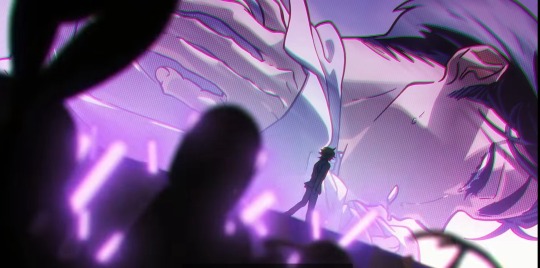
the tears in his eyes, the drool on his lips, the sweat, the way he's hugging himself looking dazed. he's lost all of his composure. he's in shambles.
honorable mention to this one:
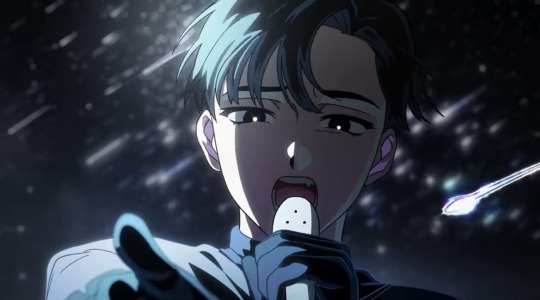
fake ass idgafer i SAW you yearning
5. Favorite outfit
probably his black sorrow one, simply because i really like the sparkly gloves
6. Favorite official art
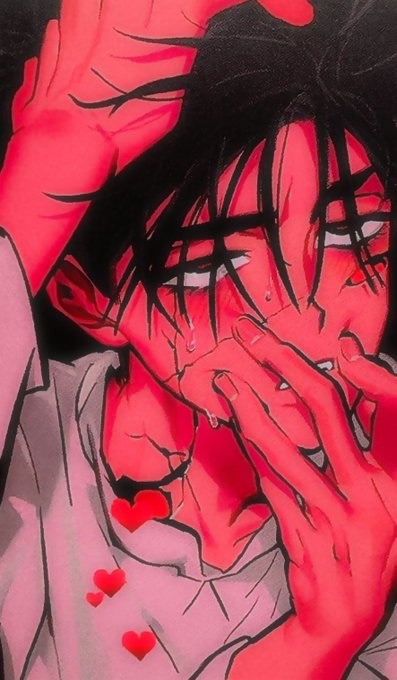
his skin being a feverish and saturated hue to emphasize his mess of emotions, the way it looks like he's trying to hold himself together but the cracks just keep spreading... YEAH. I LOVE THESE PHOTOCARD ARTS BTW
7. Favorite canon fact
he views sua as a little sister ☹️
he's so desperate for a connection it hurts
8. Favorite straight-up-not-canon headcanon
ivan's favorite class is music interpretation and theory because he wants to better understand the music till makes.
9. Favorite song/cover
it used to be cure but black sorrow has been growing on me as of late. that PIANO.
10. Song I want them to cover
ivan and sua blink gone cover would go INSANE. if not that, ruler of my heart and ivan would sound so good.
Sua:
1. Why I like them
i like how distrustful she is. how she completely contradicts everything everyone believes about her--but solely when she's with mizi. to everyone else who isn't more observant towards her, she's just an ornament. a doll. closed off and pretty, meant to be looked at but never to love, never to be loved. and then mizi completely shatters that side of her, reaches in and grasps the emotional, fun-loving side of her, and suddenly she's bursting with life, as human and happy as it gets.
i also like how sensitive she is, despite trying her best to hide it. she cries easily. she gets mad easily. she gets insecure easily. she feels, she feels so much, and it's barely hidden beneath her disinterested persona.
2. Why I don't
theres nothing that i can think of that i don't like about sua. from her impact on the story to her personality to her design, it's all so cool. so for this part im just gonna name a fault in her morality that i love.
she hid from the truth by ensuring mizi never found out about it. she couldn't see a way out, so she found a way to ignore everything at the expense of mizi's happiness. she went into alnst knowing full well what it would do to her lover, even after ivan called her out for it, and died the happiest she could have been.
3. Favorite lyric
"you hug me tight as if nothing happened"
4. Favorite frame/screenshot
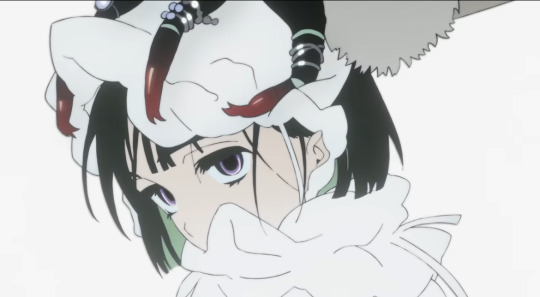
the way Nigeh had complete control of her before she met mizi. SUA MY GIRLLLLL
5. Favorite outfit
probably her doll-like dress she wore as a kid. no regard for her comfort or convenience, only the aesthetics matter. (reminds me of till's metal shoes in round 6)
6. Favorite official art
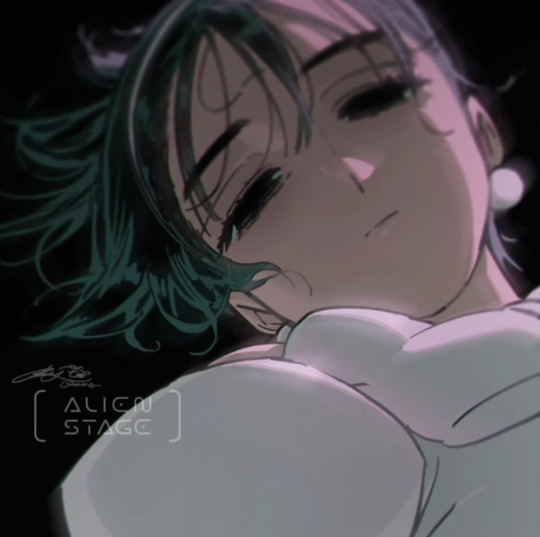
the dullness in her eyes i actually cant
honorable mention to this one:
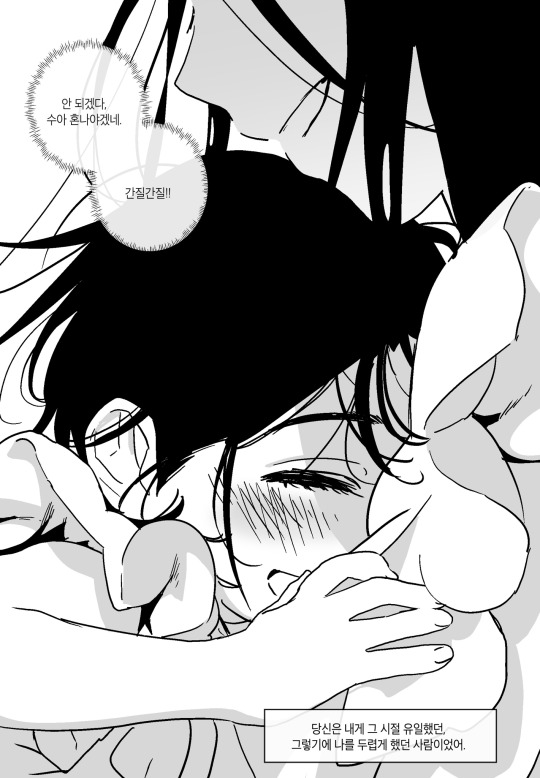
angel baby ☹️☹️☹️
7. Favorite canon fact
she used a flower that mizi gave her as a bookmark and she was so fond of it and and and
8. Favorite straight-up-not-canon headcanon
she doesn't ACTUALLY hate till and ivan, she simply doesn't want to get closer to them because she knows they'd remind her of how bad the real world is. she'll see it in ivans false smile and cynical observations, in the purple bruises and green patches on tills body. she wants nothing to do with it.
9. Favorite song/cover
MIZISUA CURE LITERALLY GIVES ME CHILLS. KILLS ME SO BAD EVERY TIME I LISTEN TO IT. the love in sua's voice is just so. oh my god.
10. Song I want them to cover
the aforementioned ivan and sua blink gone cover will be real guys TRUST 🗣️🗣️
#these two take over my brain#alnst ivan#alnst sua#alien stage sua#ivan alien stage#alien stage#alnst
33 notes
·
View notes
Text

Seraphim of Hope, Emily
[ENGLISH]
I take my time, but I deliver. Here is Emily's version from Princess of Heaven AU. Its design was based on the art of @kaledya. In this AU, she doesn't change much from her original version in terms of personality, the only difference is that she had a BFF/stepsister/possible love interest while growing up. When I talked about my problem with ships, that's what I was talking about, because I don't really know what to do here. Do I just put her as a sister/BFF or do I give in to my Team Charlie's Angels side? I also like the idea of her forming a pair with Lute, in a way mirroring Charlie and Vaggie, but I'm tempted to give in to the chaos and make an angelic quartet.
[PORTUGUÊS]
Eu demoro, mas entrego. Aqui está a versão de Emily da Princess of Heaven AU. Seu design teve como base a arte do @kaledya. Nessa AU, ela não muda muito da sua versão original em termos de personalidade, a única diferença é que ela teve uma BFF/irmã de criação/possível interesse amoroso enquanto crescia. Quando eu falei sobre o meu problema com ships era disso que eu tava falando, porque eu não sei direito o que fazer aqui. Coloco ela só como irmã/BFF ou me entrego meu lado Team Charlie's Angels? Também gosto da ideia dela formar um par com a Lute, de certa forma refletindo Charlie e Vaggie, mas estou tentada a ceder ao caos e fazer um quarteto angelical.
#fanart#digital art#hazbin hotel#my art#emily seraphim#emily#hazbin hotel emily#au#princess of heaven au#a cruel doubt#I'm team Charlie's Angels until the end#but I also like the idea of having two couples reflecting on each other#I don't know
30 notes
·
View notes
Text
Vietnam’s youth are pushing the country toward a new identity
Jessica Meyers, Los Angeles Times, Feb. 5, 2017
In front of Ho Chi Minh’s statue and the baroque yellow walls of Communist Party headquarters, they danced.
Strobe lights and bass washed over sweaty young bodies twisting in the tropical night air. The DJ took a selfie with the crowd, and the din on this downtown promenade blended with the roar of motorcycles cruising along the Saigon River.
This is the next generation’s Vietnam, where coffee roasters and tech start-ups wedge in between noodle soup vendors and bike repairmen as the city sidesteps its socialist legacy in a dash toward the future. Two-thirds of the country’s population was born after Saigon fell in 1975. Now they’re helping transform the Communist nation into one of the world’s fastest growing economies, with a hip gravity strong enough to lure back children of emigres who fled to Houston and Orange County.
These young people are creating a new national identity--one filled with capitalistic idealism, responsibility, and a belief that the country offers opportunity that many of their parents won’t acknowledge.
“We’re studying abroad, we’re traveling, we see Western culture and our own culture,” said Thao Dao, the 27-year-old co-founder of Ladan, a company that designs modern Vietnamese clothing and accessories for young adults. “For our generation, it’s time.”
She attended the Fashion Institute of Design & Manufacturing in Los Angeles, but saw her future at home in Vietnam.
Dao and a friend opened their small shop last year up a creaky flight of stairs near one of the city’s oldest markets. They filled it with bamboo purses and elegant pastel riffs on the ao dai, a traditional Vietnamese dress-pant combo.
“You can come back and make a difference,” Dao said.
She and co-founder Anna Phan, who grew up in Vietnam and graduated from Santa Clara University in California, have a dream: that a country that produces much of the world’s apparel will now become proud to wear it.
Phan’s mother survived postwar poverty jumping on and off trains to sell food. Dao’s hawked fish sauce. Their daughters hope to turn “Made in Vietnam” into a fashion symbol.
“We don’t talk about the war anymore,” Dao said.
An increasingly affluent generation is traveling abroad, especially from urban areas such as Ho Chi Minh City and Hanoi, the capital. More than 21,000 Vietnamese students attended American universities last year, the sixth largest number of foreign students in the U.S., according to the Institute of International Education.
Up to 3,000 startups operate in Vietnam, a country of 90 million whose economy has grown twice as fast as that of the U.S. in recent years.
The statue of Ho Chi Minh, the country’s revolutionary war hero, looks out at tower cranes and the city’s most expensive real estate. Residents alternate between the official name and Saigon, a throwback to six decades of French colonial rule that ended in 1954.
Bike-sharing apps like uberMOTO are replacing street-corner men who for decades offered cheap motorcycle trips. Officials are building a subway and a second airport for the city’s 8 million inhabitants.
Vietnam also has grown closer to the U.S. Then-President Obama visited in May, when he lifted a longstanding arms embargo and highlighted the country’s youth.
“This is your moment,” he told a crowd in Hanoi. “And as you pursue the future that you want, I want you to know that the United States of America will be right there with you.”
But optimism is still guarded. Young people talk about succeeding largely in spite of--not because of--the government. The one-party state is weighed down by public debt and bulky state-owned enterprises. Corruption pervades, despite an official crackdown.
Human Rights Watch ranks its record as “dire.” Officials arrested a high-profile blogger last year who criticized the government’s handling of a chemical spill that left dead fish scattered across beaches.
Saigon’s growth has alarmed preservationists who watch the destruction of French colonial buildings and the rise of skyscrapers. Pollution is increasing; income inequality is rising.
“There are energetic people trying to do great things,” said Vu Thanh Tu Anh, research director at the Fulbright Economics Teaching Program here.
“But it’s constrained by the education system, by political constraints…and we have a system which is not responsive enough to the needs of people.”
Although the country is growing faster than most, Vu said, “we’re not close to our potential.”
Hao Tran didn’t know Saigon had another name until he was 18. The San Franciscan now calls Ho Chi Minh City his home. Tran, 24, left his tech job a year ago for a country his parents fled.
“My perception of Vietnam growing up was pho and war documentaries,” he said. Now he’s co-founder of Vietcetera, an English-language website that seeks to tell “the untold stories of the new Vietnam.”
Tran and his colleagues sat in the loft of a white-walled, minimalist coffee shop they’d just helped open. It could have been in Brooklyn, except with shaken lemonade and café sua, Vietnamese coffee with condensed milk.
“We want to reach a global audience and educate them on what Vietnam has to offer,” said Tran, who’d recently met his mother’s sisters for the first time. “There’s still a lot of Wild West here; rules are ambiguous. But you can just see the energy.”
Like Tran, thousands of overseas Vietnamese--also known as Viet Kieu--are overriding parental objections and returning to a country they view through a different lens.
Eddie Thai’s mother cried when he told her he would move here.
She feared he would get cheated, that the business environment would prove too rough. Thai thought he had something to offer and it felt like the right time.
Thai’s father worked his way from a Mekong Delta rice farm to graduate school in New York. His mother escaped Saigon as it fell to northern forces.
“There’s a lot of opportunity to fill the gaps,” said Thai, 31, a Vietnam-based partner at 500 Startups, a venture capital firm based in Mountain View, Calif.
“It’s really awesome to help Vietnam and Vietnamese businesses leapfrog their partners,” he said. “This young generation is hungry. They understand the world…a lot are asking, ‘Where do we go from here?’”
Older high-level investors and business executives sound less sanguine about the prospects for rapid change, especially with a regulatory system that can impede innovation.
Some wonder whether the next generation can do much to change that.
But if they can make it last, if Vietnam can continue on its high-growth trajectory, a country once considered among the world’s poorest may become Asia’s next stunning success.
Vietnam has moved into middle-income status, and this year the World Bank will start to phase out the low-interest, lengthy payback loans it gives the country. When this generation nears retirement age, the average lifespan will reach 80, according to the United Nations, up from 73 in 2012.
Le Xuan Loc thinks less about where Vietnam is going than what it still has to achieve.
The 25-year-old pharmacist moonlights as a social activist, and dreams of opening a healthcare clinic in his rural, coastal hometown. He’s helped start a mentoring program for young people to build skills. Obama noticed something in Le that helped explain the new Vietnam, enough to mention him in his speech here.
Le doesn’t brag about the Obama shout-out, although he blushes slightly when it comes up. He blended in at yet another coffee shop, a kid with earphones around his neck sipping a green tea float and talking about hopes for his country.
“Vietnam has potential,” he said. “Why not change it instead of leave?”
0 notes